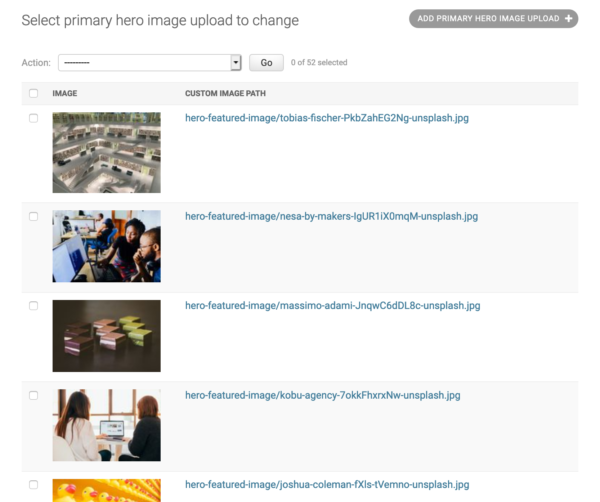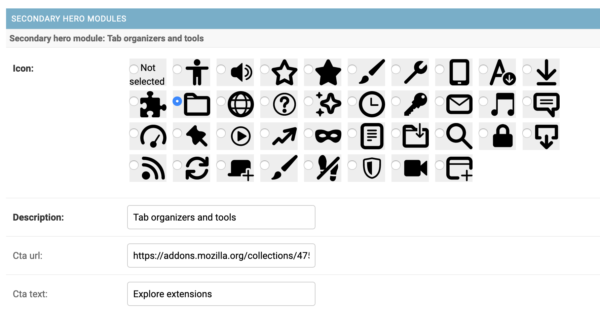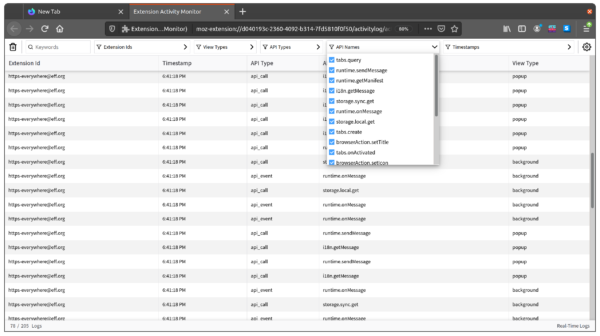For the last several years, Mozilla has participated in the Google Summer of Code and Outreachy internship programs. Both programs offer paid three-month internship opportunities to students or other industry newcomers to work on a programming project with an open source organization. This year, we were joined by Lisa Chan and Atique Ahmed Ziad, from Outreachy and Google Summer of Code, respectively.
With mentorship from addons.mozilla.org (AMO) engineers Bob Silverberg and Andrew Williamson, Lisa built a Homepage Curation Tool to help our editorial staff easily make changes to the AMO homepage. Atique was mentored by Firefox engineers Luca Greco and Rob Wu, and senior add-on admin reviewer Andreas Wagner, and he developed a privileged extension for Firefox that monitors the activity of other installed extensions. This prototype is the starting point of a new feature that will help extension developers, add-on developers, and Firefox engineers investigate bugs in extensions or in the browser’s WebExtensions APIs.
We sat down with Lisa and Atique and asked them to share their internship experiences.
Question: What were the goals of your project?
Lisa: I was able to achieve most of the goals of my project, which were to implement two major features and a minor feature on the AMO Homepage Curation Tool.
Two of the features (a major feature and the minor one) were associated with the admin user’s ability to select an image for the add-on in the primary hero area on the AMO homepage. Prior to implementing the major feature, the admin user could only choose an image from a gallery of pre-selected images. With the update, the admin user now has the option to upload an image as well. The admin tool also now utilizes the thumbnails of the images in the gallery following the minor feature update.
The second major feature involved providing the admin user with the ability to update and/or reorder the modules that appear under the hero area on the AMO homepage. These modules are sets of pre-defined add-on extensions and themes, such as Recommended Extensions, Popular Themes, etc, based on query data. The modules were previously built and rendered on the front-end separately, but they can now be created and managed on the server-side. When complete, the front-end will be able to retrieve and display the modules with a single call to a new API endpoint.
Atique: My objective was to develop the minimum viable product of an Extension Activity Monitor. In the beginning, my mentors and I had formulated the user stories as a part of requirement analysis and agreed on the user stories to complete during the GSoC period.
The goals of Extension Activity Monitor were to be able to start and stop monitoring all installed extensions in Firefox, capture the real-time activity logs from monitored extensions and display them in a meaningful way, filter the activity logs, save the activity logs in a file, and load activity logs from a file.
Question: What accomplishment from your internship are you most proud of?
Lisa: Each pull request approval was a tiny victory for me, as I not only had to learn how to fix each issue, but learn Python and Django as well. I was only familiar with the front-end and had expected the internship project to be front-end, as all of my contributions on my Outreachy application were to the addons-frontend repository. While I had hoped my mentors would let me get a taste of the server-side by working on a couple of minor issues, I did not expect my entire project to be on the server-side. I am proud to have learned and utilized a new language and framework during my internship with the guidance of Bob and Andrew.
Atique: I am proud that I have successfully made a working prototype of Extension Activity Monitor and implemented most of the features that I had written in my proposal. But the accomplishment I am proudest of is that my skillset is now at a much higher level than it was before this internship.
Question: What was the most surprising thing you learned?
Lisa: I was surprised to learn how much I enjoyed working on the server-side. I had focused on learning front-end development because I thought I’d be more inclined to the design elements of creating the user interface and experience. However, I found the server-side to be just as intriguing, as I was drawn to creating the logic to properly manage the data.
Atique: My mentors helped me a lot in writing more readable, maintainable and good quality code, which I think is the best part of my learnings. I never thought about those things deeply in any project that I had worked on before this internship. My mentors said, “Code is for humans first and computer next,” which I am going to abide by forever.
Question: What do you plan to do after your internship?
Lisa: I plan to continue learning both front-end and back-end development while obtaining certifications. In addition, I’ll be seeking my next opportunity in the tech industry as well.
Atique: Participating in Google Summer of Code was really helpful to understand my strengths and shortcomings. I received very useful and constructive feedback from my mentors. I will be working on my shortcomings and make sure that I become a good software engineer in the near future.
Question: Is there anything else you would like to share?
Lisa: I’m glad my internship project was on the server-side, as it not only expanded my skill set, but also opened up more career opportunities for me. I’m also grateful for the constant encouragement, knowledge, and support that Bob and Andrew provided me throughout this whole experience. I had an incredible summer with the Firefox Add-ons team and Mozilla community, and I am thankful for Outreachy for providing me with this amazing opportunity. ‘
Atique: I think the opportunities like Google Summer of Code and Outreachy provides a great learning experience to students. I am thankful to these programs’ organizers, also thankful to Mozilla for participating in programs that give great opportunities to students like me to work with awesome mentors.
Congratulations on your achievements, Lisa and Atique! We look forward to seeing your future accomplishments.




Dennis Chukwunta wrote on
wrote on
Caitlin Neiman wrote on
wrote on